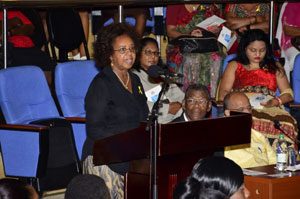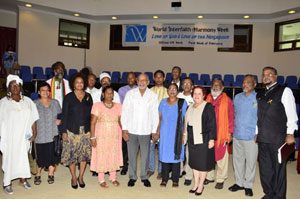
Religious and cultural diversity is a good to be treasured …President Ramotar at launch of Inter-faith Harmony Week
THE opening ceremony of the Inter-faith Harmony Week yesterday saw President Donald Ramotar calling on all religious leaders to pray for peace, harmony and tolerance, “both in our country and in the world”. The Head of State also urged the fostering of mutual understanding as a means of promoting peace. Addressing a very diverse audience at the Guyana International Conference Center, the President said diversity should be viewed as an asset rather than a liability. “It is not religious and cultural diversity that breeds mistrust and disharmony. Intolerance is not a symptom of this distrust and disharmony. It is the cause”. This action finds root where diversity is seen as a threat rather than a blessing that is good and acceptable.

United Nations Resident Coordinator Khadija Musa addressing stakeholders at the launch of the Inter-Faith Harmony Week
The President highlighted to representatives of the various religious groups and organisations, students and other stakeholders that many of the current conflicts internationally are driven by differences such as economic and class tensions masked by ethnic and religious differences, which in turn hide many of the issues affecting citizens. Religious leaders have much to do in promoting inter-faith dialogue, President Ramotar added, as, “this duty cannot be divorced from fostering cultural harmony”.
The fact that most of the present violence is driven by extremists and their actions mean that the United Nations designated Inter-faith Harmony Week observance takes on a great significance, the President said. He added that though Guyana has been spared the atrocities associated with religious and cultural extremism, the need exists to recognise and promote inter-faith harmony locally.
He emphasised that Government fully supports the resolution adopted by the United Nations on October 20, 2010, and its objectives of fostering mutual understanding and religious dialogue amongst faiths, and spreading the message of inter-faith harmony in churches, temples, mosques and other places of worship”.
The concept promoted by some about cultural superiority must be discarded, President Ramotar added, as believers feel it is right to impose their culture on others. The human race’s history is full of “many atrocities committed in pursuit of this discredited ideology of cultural superiority.” President Ramotar said, “I therefore believe that parties of any discourse are equal”.
An important aspect of any inter-faith dialogue must be respect for other races and religious beliefs, the Head of State stressed.
Guyana was described as an example to other countries about religious and cultural tolerance, but this does not mean that citizens must stop the work needed to continuously build the understanding and tolerance needed for economic and social development.
Also addressing stakeholders was Prime Minister Samuel Hinds, who said while people are different, too often humans “have differed violently”. The example set by the late president Cheddi Jagan who encouraged persons from various groups to work with him, was cited by Mr. Hinds.
The basic right such as no discrimination based on race, belief or geographic location, he added, was among those enshrined in the Constitution, and while the country has experienced its fair share of troubles, for the most part, “we have much to celebrate”.
He suggested that the Inter-Religious Organisation (IRO) could create a set of readers, “one for each grade of our primary and secondary schools” in which the stories, parables, beliefs, ceremonies and customs of various faiths could be presented. This would see future generations learning and understanding more about each other’s faiths.
United Nations Resident Co-coordinator Khadija Musa, in brief remarks, said that throughout the world, the UN continues to press for mutual understanding and inter-religious dialogue as key to promoting a culture of peace. She commended the Guyanese society for its achievements in “inter-faith harmony”. The religious community has shown that regardless of societal challenges, there is tolerance in this country”, and their importance in promoting peace among the diverse local population is very important. She added that while cultures are different, humanity remains a single community, “united around human rights and fundamental freedoms, including freedom of thought, consciousness and religion”.
The UN official said she is praying for the day when the organisation is not challenged to put out fires (conflicts), but is able to focus on development alone.
Remarks were also given by AFC representative Seenauth Chunilall, APNU’s Annette Ferguson and the PPP’s General Secretary Clement Rohee, who noted, in particular, that disharmony will not contribute to nation building, and quoted a verse from the song ‘He’s my brother’ to drive home his point of looking out for each other.
Presentations and prayers were given by religious representatives, all of whom called for peace and harmony, particularly as the nation heads to elections.
The World Inter-faith Harmony Week provides a platform, one week in a year, when all inter-faith groups and other groups of goodwill can show the world what a powerful movement they comprise. The thousands of events organised by these groups often go unnoticed, not only by the general public, but also by other groups themselves. This week will allow for these groups to become aware of each other and strengthen the movement by building ties and avoiding duplicating each other’s efforts. (GINA)

